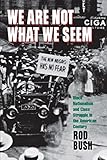We Are Not What We Seem : Black Nationalism and Class Struggle in the American Century / Roderick D. Bush.
Material type: TextPublisher: New York, NY : New York University Press, [2000]Copyright date: ©2000Description: 1 online resourceContent type:
TextPublisher: New York, NY : New York University Press, [2000]Copyright date: ©2000Description: 1 online resourceContent type: - 9780814713174
- 9780814738054
- 305.896/073 21
- online - DeGruyter
| Item type | Current library | Call number | URL | Status | Notes | Barcode | |
|---|---|---|---|---|---|---|---|
 eBook
eBook
|
Biblioteca "Angelicum" Pont. Univ. S.Tommaso d'Aquino Nuvola online | online - DeGruyter (Browse shelf(Opens below)) | Online access | Not for loan (Accesso limitato) | Accesso per gli utenti autorizzati / Access for authorized users | (dgr)9780814738054 |
Browsing Biblioteca "Angelicum" Pont. Univ. S.Tommaso d'Aquino shelves, Shelving location: Nuvola online Close shelf browser (Hides shelf browser)

|

|

|

|

|

|

|
||
| online - DeGruyter Gotham Unbound : How New York City Was Liberated From the Grip of Organized Crime / | online - DeGruyter Seeds of Empire : The American Revolutionary Conquest of the Iroquois / | online - DeGruyter William M. Kunstler : The Most Hated Lawyer in America / | online - DeGruyter We Are Not What We Seem : Black Nationalism and Class Struggle in the American Century / | online - DeGruyter Liberty Tree : Ordinary People and the American Revolution / | online - DeGruyter Money at Work : On the Job with Priests, Poker Players and Hedge Fund Traders / | online - DeGruyter Well Met : Renaissance Faires and the American Counterculture / |
Frontmatter -- Contents -- Acknowledgments -- Introduction: Reassessing Black Power -- 1 The Contemporary Crisis -- 2 Nothing but a Black Thing? The Black Freedom Struggle in Context -- 3 The Washington–Du Bois Conflict: African American Social Movements in the “Age of Imperialism,” 1890–World War I -- 4 World War I and the Deepening and Blackening of American Radicalism -- 5 From the Great Depression to World War II: The Recomposition of White-Black Alliance -- 6 The American Century: Labor Peace, Hegemony, and Civil Rights -- 7 The Crisis of U.S. Hegemony and the Transformation from Civil Rights to Black Liberation -- 8 The Future of Black Liberation and Social Change in the United States -- Notes -- Bibliography -- Index -- About the Author
restricted access online access with authorization star
http://purl.org/coar/access_right/c_16ec
An "Indispensable" Book of The Black World Today website Much has been written about the Black Power movement in the United States. Most of this work, however, tends to focus on the personalities of the movement. In We Are Not What We Seem, Roderick D. Bush takes a fresh look at Black Power and other African American social movements with a specific emphasis on the role of the urban poor in the struggle for Black rights. Bush traces the trajectory of African American social movements from the time Booker T. Washington to the present, providing an integrated discussion of class. He addresses questions crucial to any understanding of Black politics: Is the Black Power movement simply another version of the traditional American ethnic politics, or does it have wider social import? What role has the federal government played in implicitly grooming social conservatives like Louis Farrakhan to assume leadership positions as opposed to leftist, grassroots, class-oriented leaders? Bush avoids the traditional liberal and social democratic approaches in favor of a more universalistic perspective that offers new insights into the history of Black movements in the U.S.
Mode of access: Internet via World Wide Web.
In English.
Description based on online resource; title from PDF title page (publisher's Web site, viewed 06. Mrz 2024)


